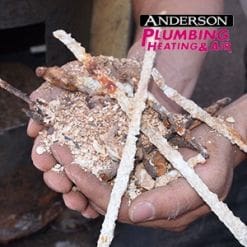
A San Diego water heater flush is not something most homeowners around here think about. But San Diego has some of the harshest water in the nation and it can cause big trouble for San Diego plumbing systems if they don’t receive regular maintenance and inspection.
Inside San Diego Water Heaters
We found this inside one San Diego water heater recently. Unfortunately, this is not uncommon. What you are looking at is the ugly sediment at the bottom of a water heater we cut open. The long pieces you see are the anode rod that had disintegrated. This is what happens when water heaters do not get flushed, and it happens more quickly in San Diego due to the poor water quality.
Why Exactly Are Water Heater Flushes More Important in San Diego?
A major reason San Diego ranked 92nd on the nation’s list of cities with the best water quality (2012) and the reason it is so hard on your water heater and other plumbing is that 85-90% of our water is imported. Because San Diego is a semi-arid region, our water must travel long distances to get here and it picks up sediment all along the way. Without a good San Diego home water treatment system and regular water heater flushes this sediment can build up quickly!
What Happens If I Don’t Get My San Diego Water Heater Flushed?
As you can see in these pictures, the results are not pretty if you neglect your San Diego water heater. Aside from having to deal with noises and rotten odors, a water heater with too much sediment build-up and decay may stop working altogether, leaving you to take cold showers. A broken water heater is quite the unpleasant unexpected expense. With regular maintenance and inspections, your water heater will last longer. With an aging water heater, inspections will help you plan ahead should you need to replace your water heater in the near future.
What About Tankless Water Heaters in San Diego?
San Diego tankless water heaters need regular flushes too. Although the harsh water doesn’t affect them as quickly as the tank variety, sediment still sinks as it moves through the heat exchanger and can attach to the interior of the copper tubing. Eventually, the scale build-up can cause over-heating, throwing the water heater’s sensor off. It will stop working until the system is fixed and reset.